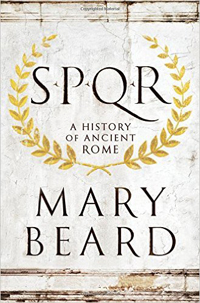 Mary Beard, SPQR; A History of Ancient Rome (New York: W.W. Norton, 2015), 606pp.
Mary Beard, SPQR; A History of Ancient Rome (New York: W.W. Norton, 2015), 606pp.
Mary Beard, professor of classics at Cambridge University, and a rebel rock star in England for her blog "A Don's Life," has spent fifty years thinking about Rome, what it meant to be "Roman," and why that still matters today. It's not that we need to learn from the Romans, she says, but we do have a lot to learn by engaging with the history of Rome. Western civilization has various roots, but "since the Renaissance at least, many of our most fundamental assumptions about power, citizenship, responsibility, political violence, empire, luxury, and beauty have been formed, and tested, in dialogue with the Romans and their writing." (535).
And so she tells the thousand-year story — from the mythical founding of Rome in 753 BCE to 212 CE, when Emperor Caracalla made every free inhabitant a full Roman citizen — of how a little town by the Tiber River grew into a global super power of 50 million people. Even the Romans, at least many of the literary elite, became self-conscious of their historical identity. Writing in about 200 BCE, the Greek historian Polybius asked, "Who could be so indifferent or so idle that they did not want to find out how, and under what kind of political organization, almost the whole of the inhabited world was conquered and fell under the sole power of the Romans in less than fifty-three years, something previously unparalleled?"
Beard takes as her organizing template the "shorthand slogan" SPQR — Senatus PopulusQue Romanus, "The Senate and People of Rome." This acronym of "civic graffiti" was plastered all over Rome (manhole covers, garbage bins, etc.), and identified the two components of political power in Roman history — the Senate and the Roman people, and, by extension, the tension between dictatorship and democracy in all their changing iterations, along with the ideas of shared power, election by popular vote (for male citizens!), limited terms in office, just war, civil disobedience, the rule of law, homeland security, taxation, military conscription, censuses and the classification of people, polytheistic religion, in short, everything concerning the res publica or "the public thing."
Beard's book is a model of sparkling prose, meticulous research, fascinating story-telling, and cautious history about what historians can and can't reliably reconstruct two thousand years after the fact. With no desire to mythologize or demonize, she's quick to separate fact and fiction. A special treat is her broad expertise in material culture, seen in the 100-plus plates and illustrations — everything from coins, plaques, urns, vases and jewelry to the remains of garbage pits. It's hard to describe most 600-page histories as a page turner, but this is definitely one of them.


